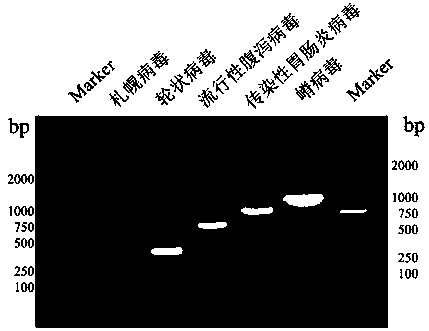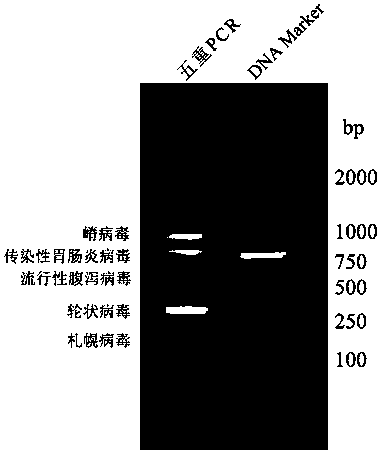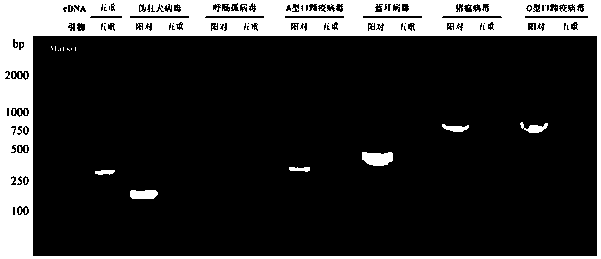A 5-plex rt-PCR detection kit for porcine viral diarrhea virus
A technique for RT-PCR and swine viral diarrhea, which is applied in the field of 5-fold RT-PCR detection kits for swine viral diarrhea virus, can solve the problems of difficult differential diagnosis, economic losses in the pig industry, and difficulty in diagnosing diarrhea.
- Summary
- Abstract
- Description
- Claims
- Application Information
AI Technical Summary
Problems solved by technology
Method used
Image
Examples
Embodiment 1
[0024] Example 1. Design and synthesis of 5-fold RT-PCR primers for porcine epidemic diarrhea virus, porcine transmissible gastroenteritis virus, porcine rotavirus, porcine Sapporo virus and porcine ridge virus
[0025] Using the sequence comparison of the known porcine epidemic diarrhea virus nucleoprotein, porcine transmissible gastroenteritis virus nucleoprotein, porcine rotavirus VP7 protein, porcine sapporo virus polyprotein and porcine ridge virus polyprotein gene sequence, find out its For the conserved region, 5-fold RT-PCR primers were designed using Oligo6 software, and the primer sequences were synthesized by Shenzhen Huada Gene Technology Co., Ltd. The sequences and lengths of the 5 pairs of primers are:
[0026]KF: ggcattgacatgaatcaggc (SEQ ID No. 1), KR: gcgatcgtaggtcttcgg (SEQ ID No. 1), 998bp;
[0027] TF: gggccaacgtaaagagcttcc (SEQ ID No. 3), TR: gctctgacctttctgcag (SEQ ID No. 4), 820bp;
[0028] PF: taggactcgtactgagggtgt (SEQ ID No. 5), PR: ctattttcgcccttgg...
Embodiment 2
[0031] Embodiment 2. Determination of reaction system and reaction conditions
[0032] First, a single primer is used to amplify the corresponding template at different concentrations such as figure 1 As shown, the optimal concentration of primers for screening 5-fold RT-PCR amplification reactions is as follows figure 2 shown; based on this, all the primers were mixed to screen for the optimal reaction concentration of each primer. The optimal primer reaction concentration of the 5-fold RT-PCR detection method was finally determined by optimization screening as follows: porcine epidemic diarrhea virus, each 0.3 pmol / µL; porcine transmissible gastroenteritis virus, each 0.05 pmol / µL; porcine rotavirus Viruses, each 1.6 pmol / µL; porcine sapovirus, each 0.2 pmol / µL; porcine crest virus, each 0.2 pmol / µL. The reaction system is: EcoTaq12.5µL, cDNA 5µL, primer mix 7.5µL, ddH 2 O to make up to 25 µL of the total system. The reaction conditions were: 94°C for 4min; 35 cycles of...
Embodiment 3
[0033] Example 3. Specific detection
[0034] Amplify common swine disease pathogens with a defined reaction system and reaction conditions: porcine reovirus, porcine blue ear virus, swine fever virus, porcine pseudorabies virus, foot-and-mouth disease type A virus and foot-and-mouth disease type O virus (the above-mentioned common swine disease pathogens identified before the experiment as image 3 shown), with porcine epidemic diarrhea virus, porcine transmissible gastroenteritis virus, porcine rotavirus, porcine saapporo virus and porcine crest virus as controls. The results showed that the detection method could only specifically amplify the corresponding fragments of porcine epidemic diarrhea virus, porcine transmissible gastroenteritis virus, porcine rotavirus, porcine saapporo virus and porcine cristae virus, while porcine reovirus, porcine PRRS virus, swine fever virus, porcine pseudorabies virus, foot-and-mouth disease type A virus and foot-and-mouth disease type O v...
PUM
 Login to View More
Login to View More Abstract
Description
Claims
Application Information
 Login to View More
Login to View More - R&D
- Intellectual Property
- Life Sciences
- Materials
- Tech Scout
- Unparalleled Data Quality
- Higher Quality Content
- 60% Fewer Hallucinations
Browse by: Latest US Patents, China's latest patents, Technical Efficacy Thesaurus, Application Domain, Technology Topic, Popular Technical Reports.
© 2025 PatSnap. All rights reserved.Legal|Privacy policy|Modern Slavery Act Transparency Statement|Sitemap|About US| Contact US: help@patsnap.com



